As artificial intelligence becomes increasingly integrated into our daily routines, understanding how AI voice calls work and their potential applications is essential. Whether you're a business looking to enhance customer service, a developer eager to incorporate AI in new products, or simply a tech enthusiast curious about the future of communication, this article will provide you with all you need to know about AI voice calls, from their basic mechanics to advanced features and the ethical considerations surrounding their use.
What Are AI Voice Calls?
AI voice calls use artificial intelligence to conduct phone conversations, enabling systems to perform real-time, interactive communication with users, forward calls to the correct department, and even autonomously handle live calls in a human-like manner. These inbound and outbound calls are powered by AI technologies that process spoken language through advanced algorithms, enabling them to understand intent and respond in a natural manner. AI voice calls allow AI assistants to handle calls with the same precision as humans and respond in a personalized manner rather than from a set list of answers.
How AI Voice Calls Work
AI voice calls utilize conversational AI, a sophisticated combination of text to speech and generative AI technology that empowers computers to engage in dialogue with humans in a way that mimics human conversation. Unlike traditional systems that rely on pre-recorded responses, conversational AI uses natural language processing (NLP) to understand and interpret the user's speech or text input. This technology allows AI to grasp not only the content of a phone call conversation but also the context and intent behind it.
As the AI interacts with users, it learns from each conversation, adapting its responses to better suit the individual's needs and preferences, much like a human receptionist who remembers your preferences and adjusts their approach accordingly. This capability for personalized interaction enables AI voice calls to handle a wide range of tasks, from customer service inquiries to more complex dialogue, providing real-time responses that are tailored to the specific situation and user.
How to Use AI Voice Calls
Using AI voice calls involves integrating AI technologies into existing phone systems or creating new AI-powered communication platforms. These systems can manage a wide range of functions such as forwarding calls, automating follow-ups, and handling large volumes of both inbound and outbound calls through a set phone number. Businesses can utilize AI voice call agents through simple, no-code platforms or more customized solutions developed using APIs like Speechify Text to Speech API. This flexibility in deployment allows organizations to enhance their customer support, sales, and marketing efforts efficiently.
Benefits of AI Voice Calls and Agents
AI-powered voice calls can transform traditional phone systems, enhancing the way businesses interact with customers and automating routine communications. Here are just a few benefits of AI voice call agents:
- Improved Customer Satisfaction: AI voice agents provide immediate, 24/7 responses to customer inquiries, significantly improving the customer support experience by minimizing wait times and delivering consistent service.
- Lower Operation Costs: The automation of repetitive tasks, like outbound and inbound calls, frees up human agents to focus on more complex issues, thus optimizing call center operations and reducing operational costs.
- Seamless Integration: These agents can be seamlessly integrated with other AI tools and platforms, like Zapier and CRMs, allowing for a unified approach to customer service across various channels.
- Increased Engagement: AI voice agents can proactively engage customers by notifying them about new offers, updates, or reminders, thus increasing customer engagement and loyalty.
- Continuous Improvement: AI voice call agents learn from each interaction, enabling continuous improvement in service delivery based on real-time feedback and evolving customer needs.
The Difference Between AI Voice Calls and Robocalls
Robocalls are often associated with scams, utilizing automated phone calls to deceive recipients into revealing personal information or transferring money to fraudsters. These robocall scams can be particularly distressing as they may target vulnerable individuals, including seniors or those not familiar with such tactics, often pretending to be a crisis involving loved ones to provoke an immediate reaction. In contrast, conversational AI focuses on facilitating helpful and interactive communication between machines and humans, aiming to assist rather than deceive. Unlike voice scammers who exploit technology for malicious purposes, conversational AI developers strive to create ethical applications that enhance user experience, and provide information, and support without misleading or causing harm.
Key Features of AI Voice Call Technology
AI voice call technology not only enhances the efficiency of communications but also personalizes the customer experience, adapting dynamically to the context of each conversation. Some of the most important features that define this innovative technology include:
- Multilingual Support: AI voice agents can interact in multiple languages, breaking down language barriers and making services accessible to a global audience.
- Emotion Recognition: AI voice call systems can detect and respond to emotional cues in a customer's voice, allowing for more empathetic and contextually appropriate interactions.
- Voice Cloning: Voice cloning technology enables AI voice call agents to deliver communications in a customizable voice, adding a personal touch to automated calls and making interactions feel more natural.
- CRM Integration: AI voice technologies can integrate with Customer Relationship Management (CRM) systems, enabling them to pull relevant customer data during calls to provide more informed and personalized service.
- Call Handling: AI voice call systems are equipped to manage live calls and leave voicemails efficiently, ensuring minimal wait times, quick resolutions, and improved workflow.
- Follow-Up Text Messages: After a call, some AI voice call agents can automatically send follow-up messages to confirm details or provide additional information, enhancing communication clarity.
- Real-Time Responses: AI voice call agents can generate real-time responses based on the conversation flow, ensuring that each customer interaction is as productive and smooth as possible.
Use Cases of AI Voice Calls
AI voice call agents not only streamline operations but also significantly improve user experiences by offering timely and context-aware responses to a variety of needs. Let’s explore just a few different use cases of this artificial intelligence technology:
Customer Support
AI voice agents excel in handling common customer queries and issues, providing fast and accurate responses that increase customer satisfaction and loyalty.
Call Center Operations
In call centers, AI voice call agents can manage high volumes of incoming calls, reduce wait times, and prioritize calls based on urgency, streamlining operations and optimizing resource allocation.
Healthcare Appointments
AI voice technology enables patients to book, reschedule, or cancel appointments effortlessly. It can also handle prescription refill requests and provide pre-appointment instructions, improving access to healthcare services and administrative efficiency.
Automated Sales and Lead Generation
AI voice agents can automate parts of the sales process, like initial contact and qualification of leads. This speeds up the sales cycle and increases the productivity of sales teams by focusing their efforts on high-potential leads.
Travel and Hospitality Management
AI voice agents can assist customers in booking, modifying, and canceling reservations for hotels, flights, and rental cars. They can provide real-time information about travel restrictions, weather updates, and local attractions.
Financial Services Inquiries
Banks and financial institutions can use AI voice calls to automate routine transactions like balance inquiries, fund transfers, and bill payments, freeing up human agents for more complex financial advisories.
Retail Customer Service
In retail, AI voice agents can handle order processing, product inquiries, stock checks, and return policies, providing a seamless shopping experience by reducing wait times and improving customer engagement.
Real Estate Appointments
AI can automate appointment scheduling for property viewings, send reminders, and provide detailed property descriptions and pricing information, enhancing the efficiency of real estate transactions.
Emergency Dispatch and Management
AI voice calls can be used in emergency dispatch systems to triage calls based on urgency, gather preliminary information, and route calls to appropriate emergency services, thus speeding up response times.
Education and Enrollment Services
Schools and universities can employ AI voice agents for handling course registration, and tuition payments, and providing information about schedules, improving the administrative efficiency and student experience.
Insurance Claim Processing
AI voice agents can streamline the initial stages of filing insurance claims by collecting necessary information, guiding customers through the process, and even scheduling assessments, thereby accelerating claim processing.
Event Management and Ticketing
AI voice agents can automate ticket booking, send event reminders, provide information about event schedules, and manage cancellations or changes, streamlining event logistics and improving attendee experience.
Restaurant Requests
AI voice agents can take reservations, process take-out orders, and answer common customer inquiries about menu items, hours of restaurant operation, and dietary accommodations. This technology can also provide upselling prompts based on customer preferences, enhancing service and increasing sales.
Choosing the Right AI Voice Call Solution
When selecting an AI voice call solution, businesses should evaluate the technology’s integration capabilities, the quality of voice automation, compliance with data protection regulations, the level of customer support provided by the vendor and the pricing. These factors are essential for ensuring the solution effectively meets the specific needs of the business and provides a positive return on investment.
Create Custom AI Voice Call Agents
When crafting tailored AI solutions such as AI voice call agents, selecting the right text to speech (TTS) and voice API is crucial for achieving high-quality, realistic voice outputs. Speechify’s text to speech and AI Voice API excels as an robust and adaptable option for developers eager to incorporate AI voice functionalities into their applications. In fact, it provides:
- Highly Natural Voices: Speechify Text to Speech API provides over 200 AI voices that are hyper-realistic. These voices are engineered to emulate authentic speech patterns, making them perfect for various applications including AI voice call agents.
- Customization Capabilities: Developers have the ability to tailor Speechify Text to Speech API’s voices to meet specific brand requirements. Modifications in tone, pitch, Pronunciation, emotion, and speed enable the creation of customized voice experiences that connect with intended audiences.
- Extensive Language and Dialect Support: Supporting more than 50 languages, including Spanish, English, Polish, Korean, and many more, along with dialect variations such as Castilian versus Mexican Spanish, Speechify’s AI voice API is ideal for creating AI voice call agents that allow businesses to speak to a worldwide customer base effectively.
- Scalable Infrastructure: Speechify Text to Speech API's infrastructure is capable of handling high-demand scenarios, providing reliable performance for applications that engage in extensive voice interactions.
- Advanced AI Features: Incorporating advanced AI functionalities, such as emotion-rich speech and contextual comprehension, Speechify’s AI voice API enhances user interactions, offering a more dynamic experience.
- Low Latency for Immediate Responses: Essential for real-time applications like virtual assistants and conversational AI interfaces, Speechify’s AI voice API maintains low latency, delivering prompt and efficient voice responses.
- Unique Voice Creation: Offering custom voice generation and voice cloning, Speechify Text to Speech API allows businesses to develop a distinctive voice identity. This feature enables the replication of specific voice styles or the creation of new ones tailored to a brand’s identity.
AI Voice Call Platforms
Utilizing text to speech APIs such as Speechify Text to Speech API simplifies the development of top-tier AI voice agent platforms, providing natural voices, extensive customization options, and multilingual capabilities to accommodate a wide range of user preferences. In fact, the market is witnessing a growing influx of AI voice call agent platforms. Let’s review what some of the leading AI voice agent platforms offer:
Bland AI

Bland AI provides sophisticated AI voice agents that automate and improve phone-based customer interactions for various industries. These agents engage in natural conversations akin to a human receptionist, handling inquiries, scheduling, and feedback with ease. This technology boosts customer service scalability and ensures consistent communication quality, making it a crucial tool for businesses looking to enhance their customer interaction processes.
Synthflow AI
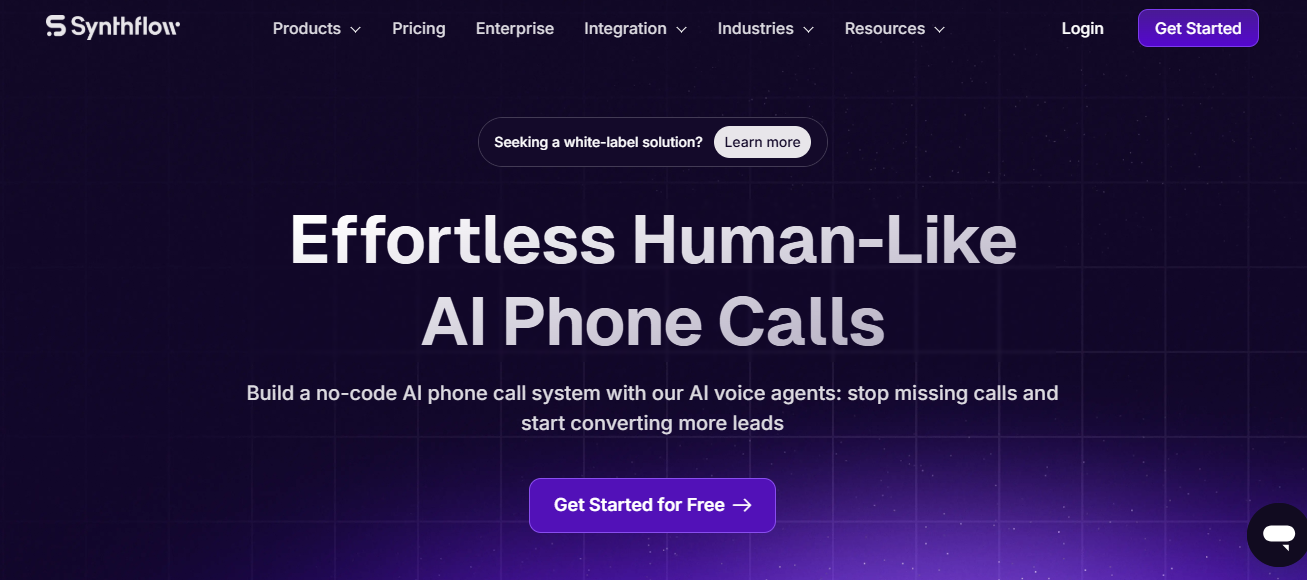
Synthflow AI is a no-code platform that enables businesses to create and deploy AI voice assistants without coding. Its intuitive interface simplifies AI integration into customer interactions, boosting engagement and efficiency. Key features include real-time voice interactions, text-to-speech, and extensive customization options for tailored communication solutions. Synthflow seamlessly integrates with various CRM systems and tools, supporting functions from lead qualification to customer support. Designed for scalability and reliability, it manages millions of calls, automating tasks like appointment booking and feedback collection.
Air.AI
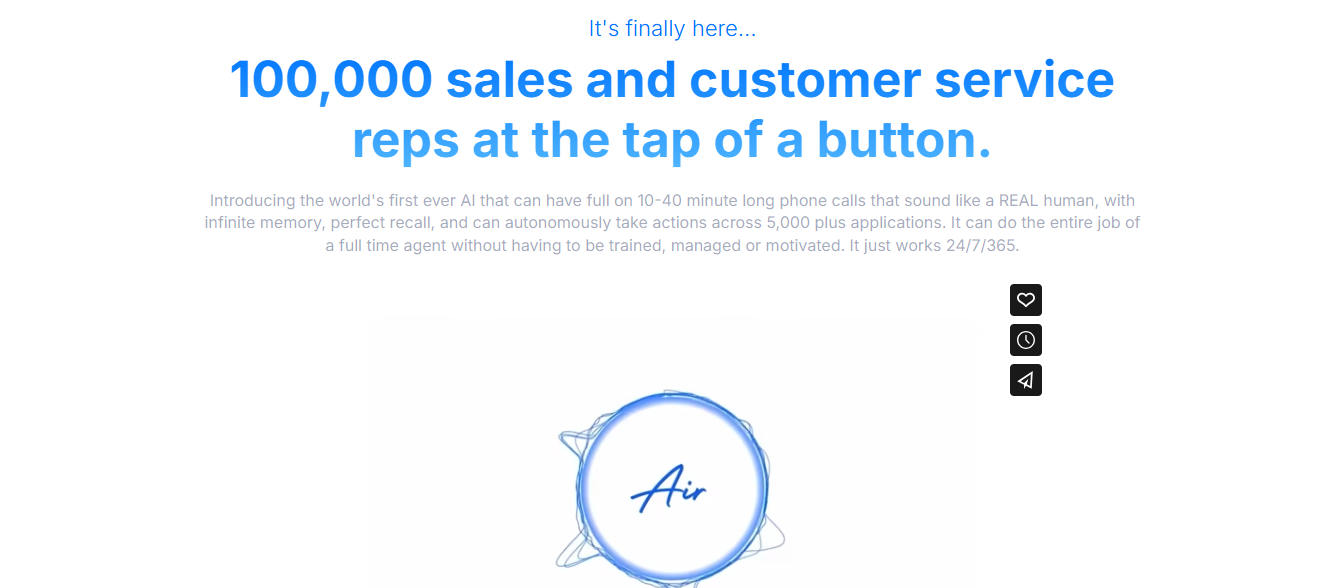
Air.AI is a leading AI platform designed for prolonged, realistic phone conversations, mimicking human interactions. It operates autonomously around the clock, handling customer service and sales calls without breaks, enhancing operational efficiency and customer engagement. Air.AI requires no training, significantly cutting costs compared to human agents, and features infinite memory for personalized, informed customer interactions. Its ability to integrate seamlessly with over 5,000 applications makes it invaluable in automating complex workflows and tasks.
Retell AI
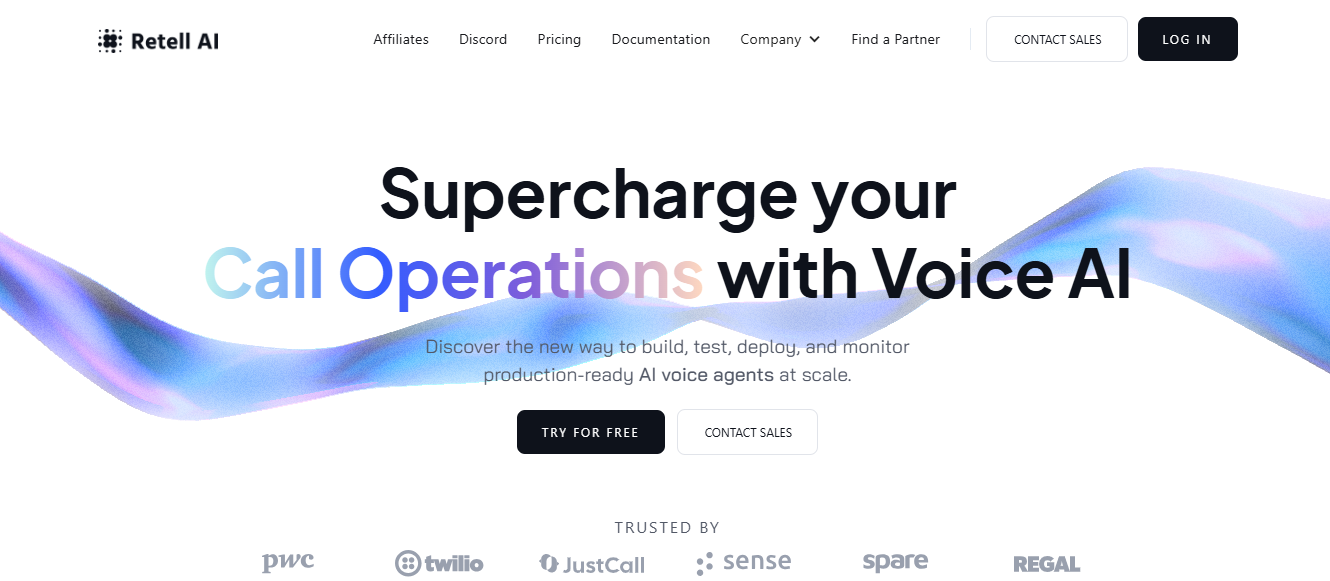
Retell AI is a powerful platform tailored for creating, testing, deploying, and monitoring AI-driven voice agents that engage in natural, human-like conversations. Notably, it boasts an ultra-low latency of approximately 800ms, facilitating nearly real-time interactions that improve the fluidity and responsiveness of conversations. Its ability to integrate seamlessly with diverse systems makes it adaptable for various business uses.
PlayHT
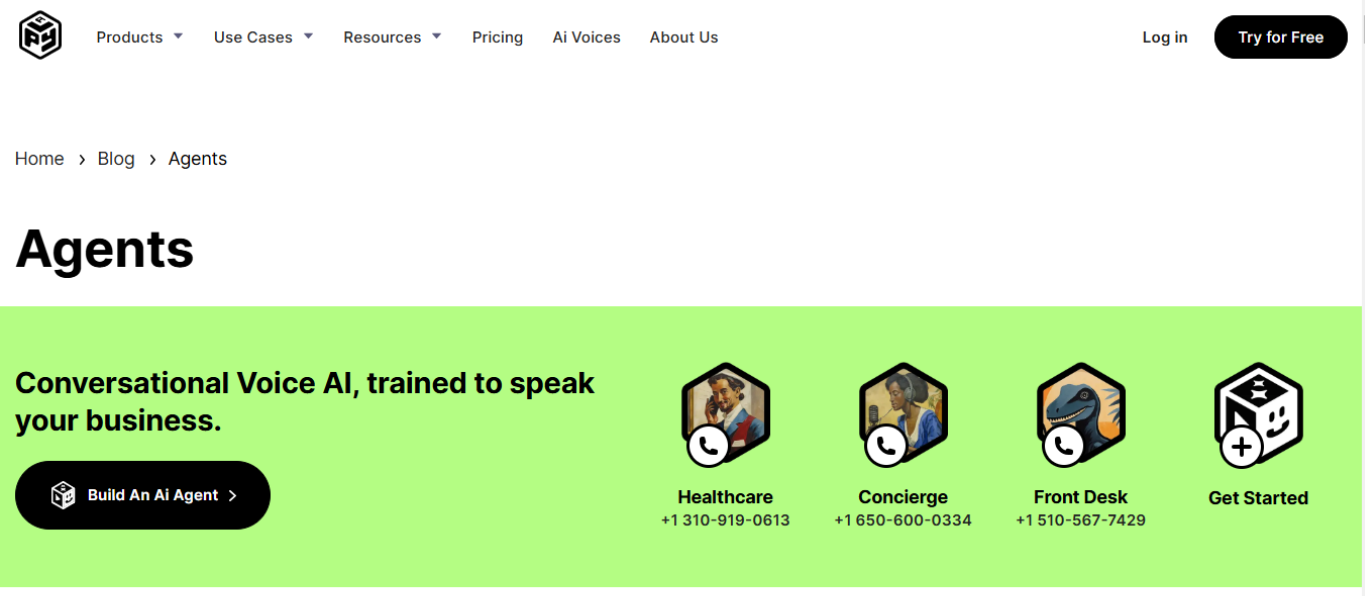
PlayHT provides industry-specific AI voice agent templates for sectors like restaurants, hospitality, and healthcare. These templates are engineered to handle conversations as smoothly as a human receptionist, managing tasks such as booking reservations, responding to guest inquiries, or scheduling patient appointments with the natural flow and responsiveness of a live operator. This makes PlayHT an excellent resource for businesses aiming to automate their customer service while ensuring high levels of user engagement and satisfaction.
JustCall
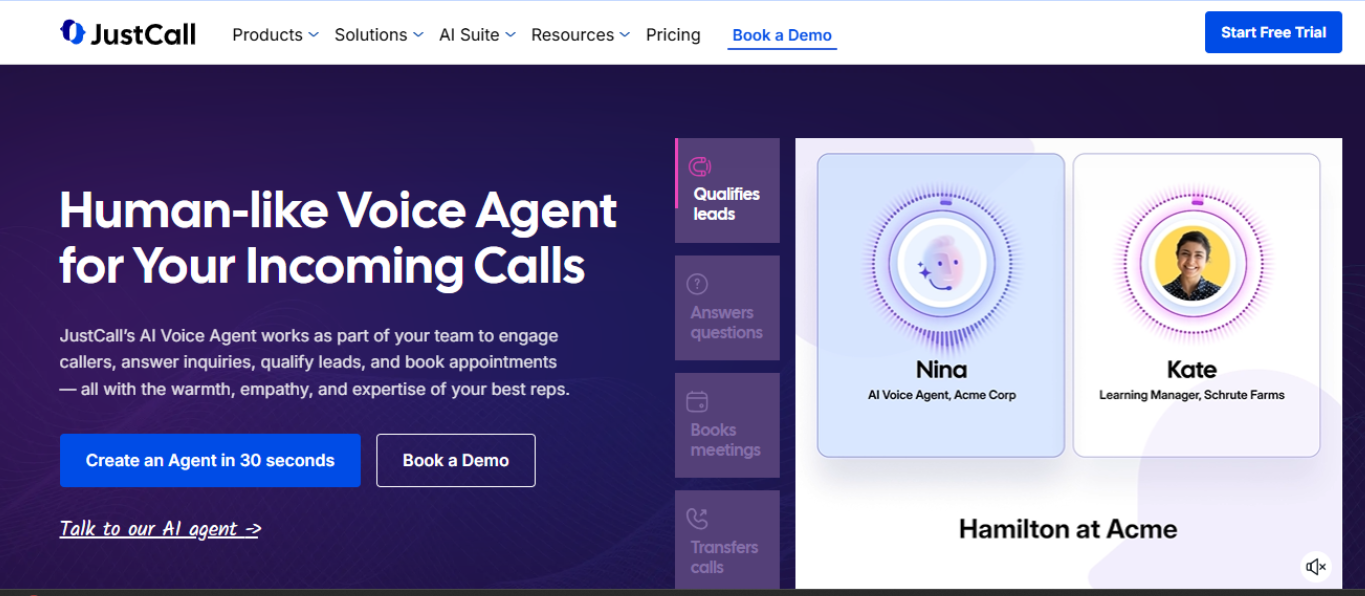
JustCall is a cloud-based AI phone system tailored for sales and support teams, featuring an auto-dialer, IVR, call routing, and integration with numerous CRM systems to boost telephony operations. It enables teams to place and receive calls directly through their CRM, offering detailed analytics to refine call strategies. With additional capabilities like SMS campaigns, appointment scheduling, and performance tracking, JustCall serves as an all-encompassing communication solution for businesses.
Calldesk
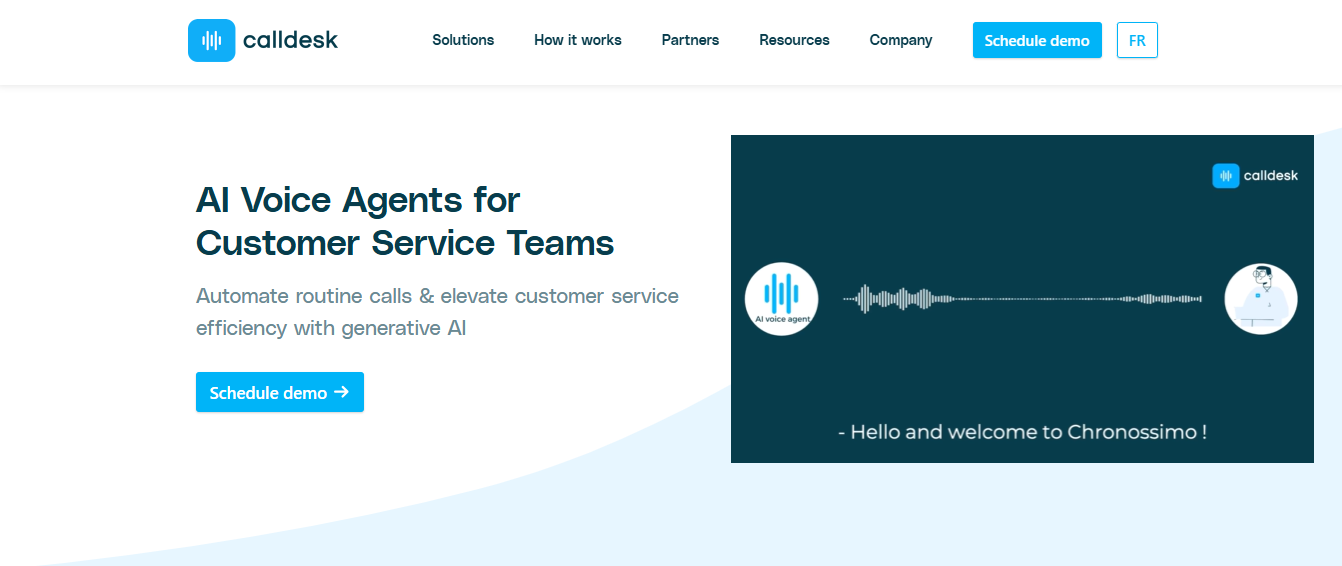
Calldesk is an AI voice agent built to autonomously manage high volumes of customer calls. Capable of handling tasks like appointment scheduling, customer inquiries, and issue resolution independently, Calldesk integrates with existing call center software to deliver a seamless service experience. Its natural language understanding enables it to navigate complex interactions, thereby lightening the load on human agents and enhancing operational efficiency.
Best AI Voice API for Building Custom AI Solutions - Speechify Text to Speech AI
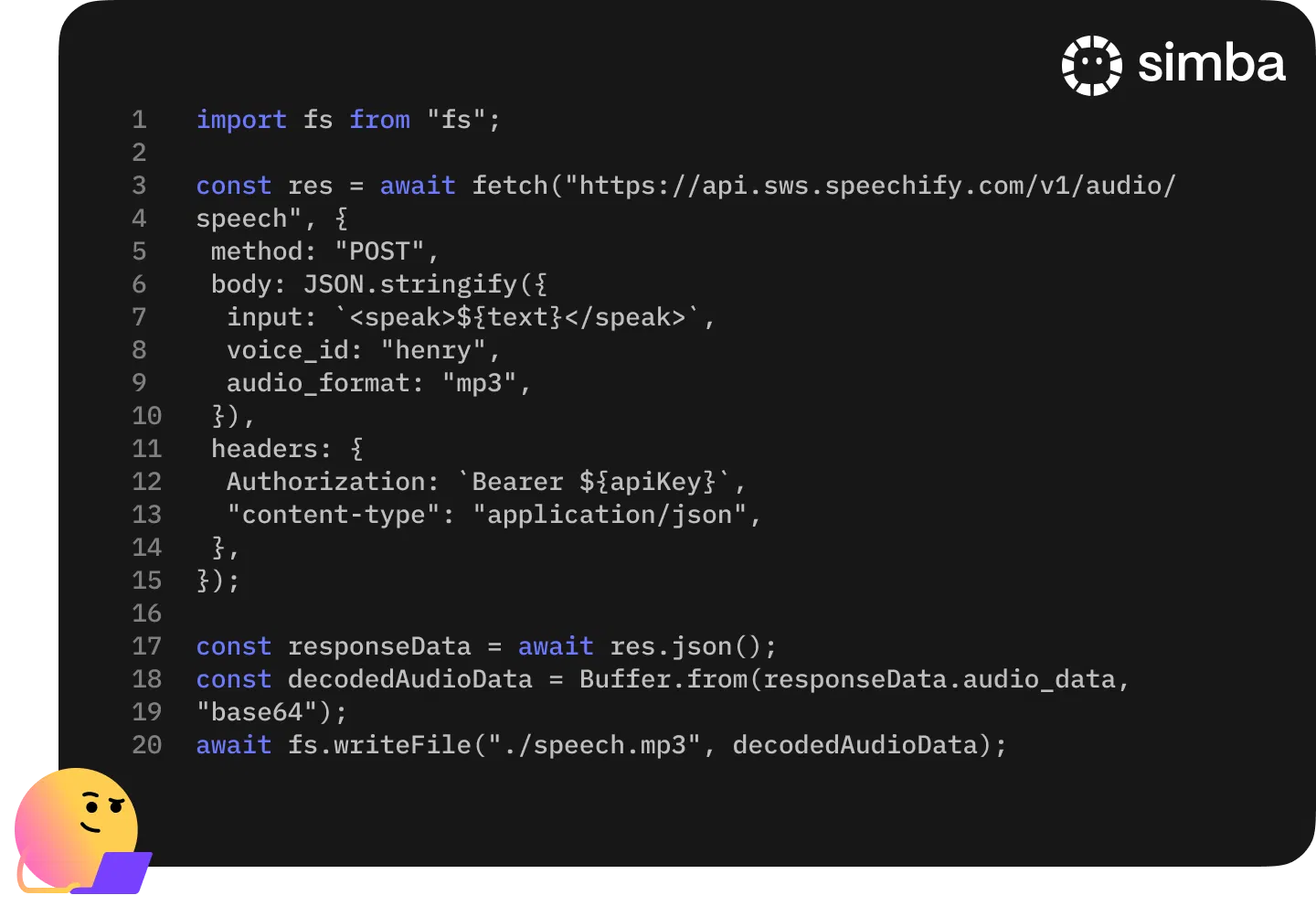
With the Speechify Text to Speech API, you have the freedom to construct fully personalized AI voice agents that meet your unique requirements. Whether you're aiming for a distinctive voice that echoes your brand's identity or an AI agent with a particular character, Speechify Text to Speech API gives you the tools to meticulously customize every element. Control tone, pitch, pacing, language, and emotional delivery to create AI voice call agents that truly engage your audience and offer a deeply personalized experience.
FAQ
Is AI calling illegal?
AI calling must comply with regulations such as the Telephone Consumer Protection Act, which requires consent for certain types of calls.
Are AI voices legal?
AI voices are legal to use, provided they adhere to copyright laws and respect privacy standards when generating and utilizing synthetic speech.
What is call center voice AI?
Call center voice AI is a technology that uses artificial intelligence to simulate human-like interactions over the phone, enhancing customer support with efficient and personalized service.
Is voice AI free?
Speechify Text to Speech API is a text to speech API provider that offers a free plan. For more advanced features, Speechify also offers affordable pricing plans.
What is call center voice AI?
Call center voice AI employs sophisticated AI algorithms to manage calls more effectively, reducing wait times and improving customer satisfaction through natural-sounding, automated conversations.
Can AI make phone calls?
Yes, AI can make phone calls, utilizing technologies like Speechify Text to Speech API to automate and personalize communication efficiently.
How can businesses use AI for automated voice calls to improve customer service?
Businesses can use AI for automated voice calls to streamline customer inquiries, provide 24/7 support, and deliver information seamlessly, ultimately boosting customer service quality.
What are the best AI voice call services for businesses?
Speechify Text to Speech API is among the best AI voice APIs for businesses, offering customizable, clear, and natural-sounding voice options to enhance customer interactions and build custom AI voice call agents.
Can I use ChatGPT’s LLM to create content for social media?
Yes, you can use ChatGPT's LLM to create content for social media, leveraging its ability to generate engaging and relevant text tailored to your audience's interests.

